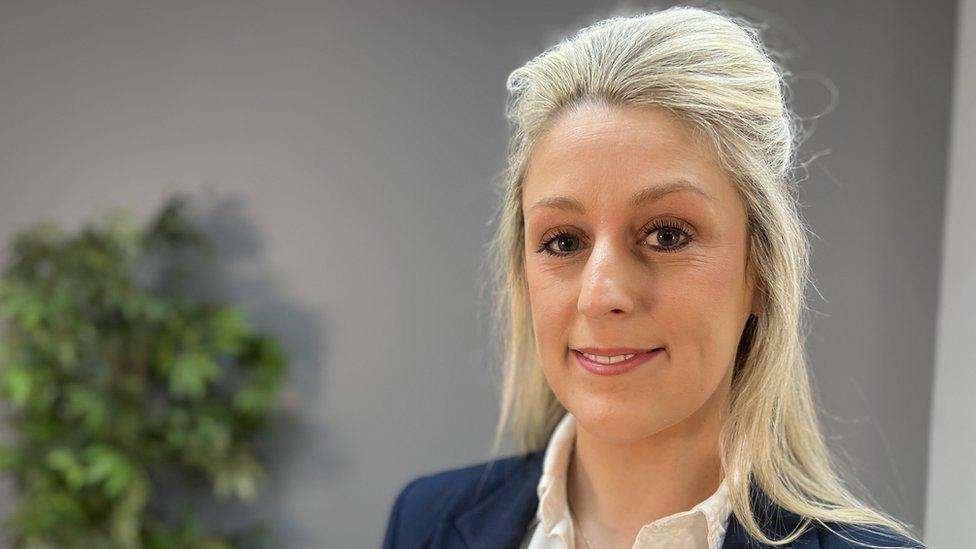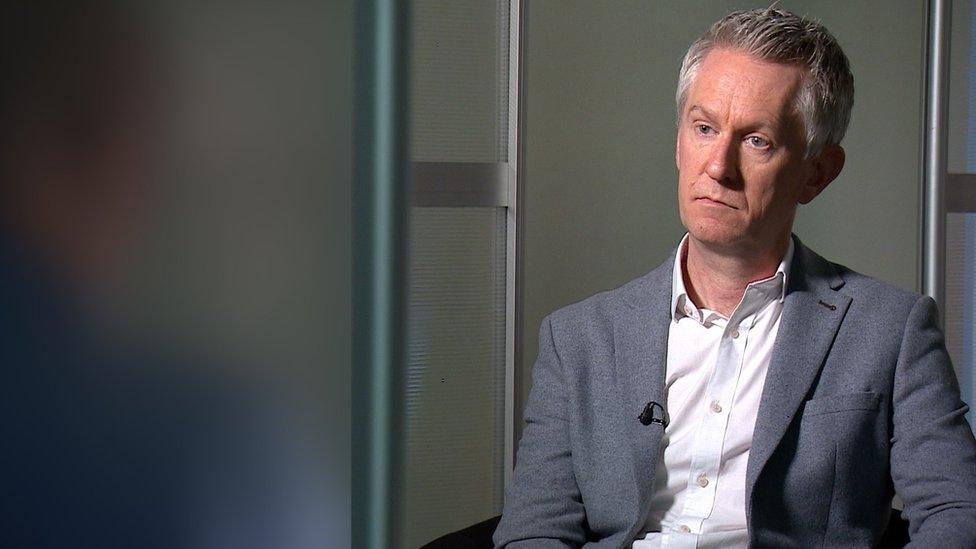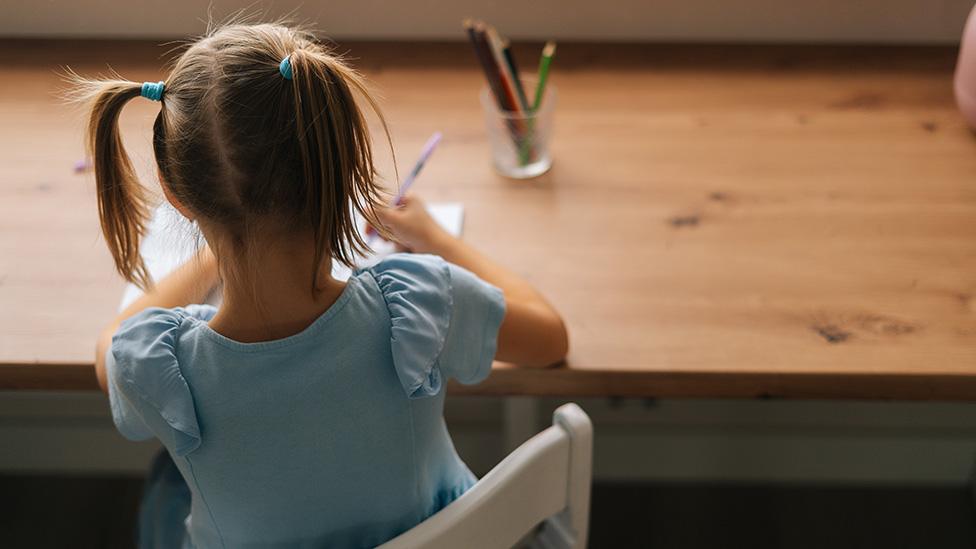adoption
Memories
18th July 2010
I first started a journal back in September 2004 and several weeks after finding my son. I had stated posting on an adoption forum when someone suggested doing so as a way to help myself cope. Up until I found my son, I had been silent, not even talking to my husband about him. It had been my sister who had told my husband about my son about six months after we had married.
My adoption journey had started back in 1981 when my son was born on the 3rd August. I had split from his father soon after I fell pregnant and didn’t tell him when I found out. It was wrong not to. I was angry and didn’t want him to have anything to do with my baby nor did I think he would believe that the baby was his. However, I wanted to raise my son so kept quiet long enough not to be pressured into aborting by my parents. They had done this to my sister when she was 15 and had fallen pregnant. She and her boyfriend who was working wanted to raise their baby, but it wasn’t to be.
When my parents found out they were so angry and decided my baby was to be adopted. They arranged everything despite me not agreeing to it and refusing to talk about it. The first time I saw a social worker from the adoption agency was after my son was born. I told her how I felt, and she told me she would put a halt to the adoption. This didn’t happen and between her and my parents they constantly lied to me. I believed the lies, didn’t know my rights, didn’t see any paperwork and it is questionable I signed anything, so I was a complete walkover.
I was expected to get on with my life, never talk about my son and to forget about him. I got on with my life, didn’t talk about my son but I never forgot about him. Subsequently I suffer with depression to the point of being suicidal at times and self-harmed.
It was a shock when I found my son in 2004 days after his 23rd birthday on Genes Reunited. It turned out he had been searching for me for five years and had found my family quite quickly. They never told me, nor did they ever tell him where I was. I was so angry at the time although I didn’t let him know that. It was a few weeks before I let my parents know I had found my son. Their excuse for not telling me about contact was that they didn’t know if my husband knew about him. All I could assume was either they were telling the truth, or they did know what my sister had done. I didn’t want this to get the better of me so left it at that.
However, with reunion my emotions exploded to the surface, and I found it hard to cope. So, when the suggestion of keeping a journal was given, I jumped at it. I had been silent for 23 years and now it was my time to talk even if it was by the written word. I started a journal on the forums I belonged to at that time as I wanted to share my feelings.
Reflection of adoption
It’s coming up for the most hated time of the year for me. It will be 44 years on the 3rd August that my son was born and it doesn’t get any easier. I shouldn’t let it get to me so much yet it still does and I still can’t talk about it either. It probably comes down to I was expected to carry on as normal as if nothing had happened.
I can still remember my son being born as is it was a recent event. There wasn’t anybody to celebrate with and my tears were of pain and sadness not happiness. I insisted on seeing him and that was the only time I felt happy knowing how beautiful he was. At the same time I knew deep down that this was one battle I wouldn’t win and I wouldn’t raise him.
Reflection on adoption
I haven’t spent time writing anything on adoption and me as it seemed easier not think about it. Even when conversations have come round to children I tend to deflect or keep quiet. My friends I.R.L don’t have an adoption connection so it can be hard to mention anything particularly as my son and I don’t talk. One friend’s daughter has been approved to adopt and I know I can talk with this friend as she knows the basics. I’d rather be able to talk to someone even as an adoptive grandmother as it may help knowing that cut backs are happening with adoption support. It’s wrong as the children need as much support as possible.
To be continued …..
Plaque to be ‘reminder of the pain of forced adoption’
Plaque to be ‘reminder of the pain of forced adoption’
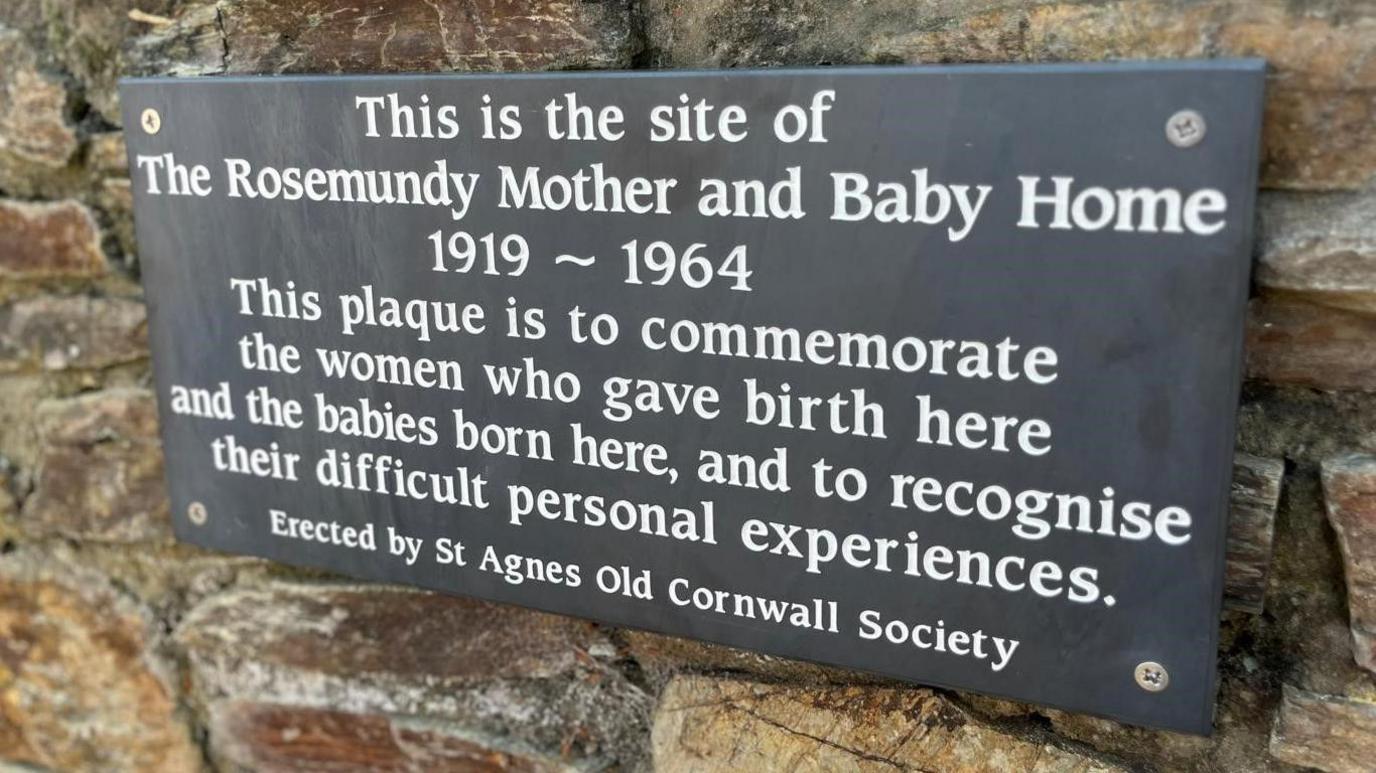
Alex Green
BBC News, South West
Tamsin Melville
BBC Spotlight
- Published10 May 2025
Victims of forced adoption have gathered in Cornwall for a public event condemning the treatment of unmarried mothers in post-war Britain.
They unveiled a plaque at Rosemundy House in St Agnes – formerly a home for unmarried mothers – while calling for a formal “adoption apology” from the government.
Dr Phil Frampton, who was born at the Rosemundy Mother and Baby Home in 1953, said: “We want an apology, not only for the mothers but also for their children who suffered.”
Lyn Rodden, from Camborne, who was one of those forced to give up her baby, said: “It means everything that we’ve been recognised at last.”
‘Struggle for an apology’
It is estimated up to 250,000 women in Britain were forced to give up their babies in the decades after World War Two.
Campaigners also want “restorative actions” from the government, such as providing counselling and search support for mothers and those forcibly adopted.
Dr Frampton, a member of the Rosemundy Commemoration Committee, said he spent years in foster care after he was separated from his mother as a baby.
He said: “It’s really pleasing to be here today, it’s the start of a new chapter in the struggle for an apology for all those unmarried mothers who suffered in the post-war period.”
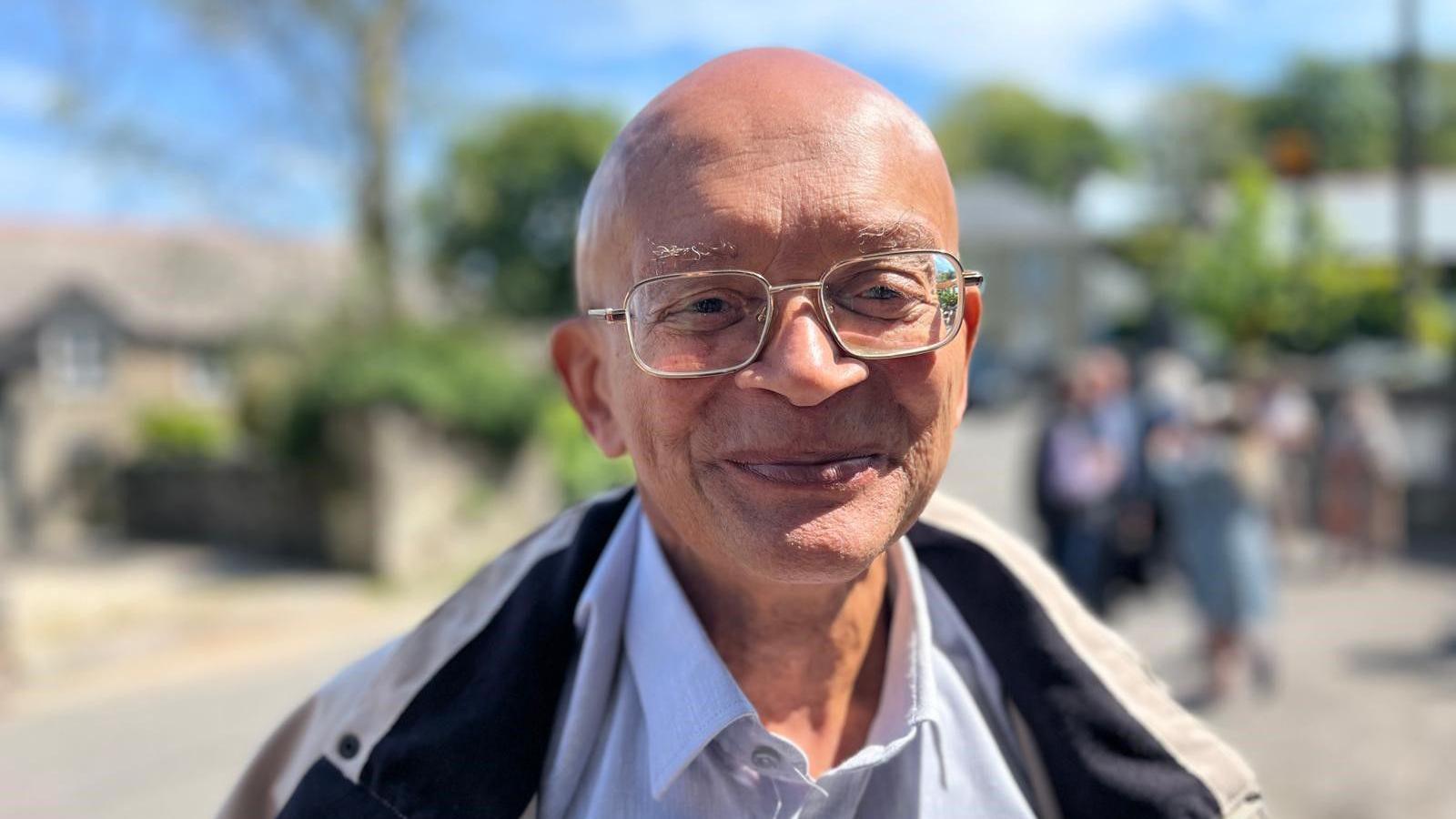
Mr Frampton said the day was “part of a day of healing, part of a day of recognising the grief of those mothers…”
He added: “This is not something that’s just in the past, for a lot of women they lived with this, you hear women today 80, 88 years old, who are still having to live with what happened, and the children live with it, and families live with it.”
Mr Frampton said it was “important” to be able to give the mothers, children, and families affected by forced adoptions “a sense of relief and release”.
Another plaque is due to be unveiled by the campaigners in Kendal, Cumbria, on 23 May.
‘Cried all the way home’
In September 1956, 19-year-old Lyn Rodden from Camborne, Cornwall, gave birth to her son at the Rosemundy home.
She said she was forced to get on a train and take her son to Bath to be adopted.
Ms Rodden said: “For everybody else the parents came here and took them away from here, but I had to get on a train and take my son up to Bath, and leave him in an office.
“A woman just came out and said ‘name’ and ‘I’ll take the baby’ and she took him into the back office, came out and said ‘hurry up’ she said, ‘catch your train’ she said, ‘and back to St Agnes, you’ll be there for another six weeks’.
“That was it. I cried all the way home…”
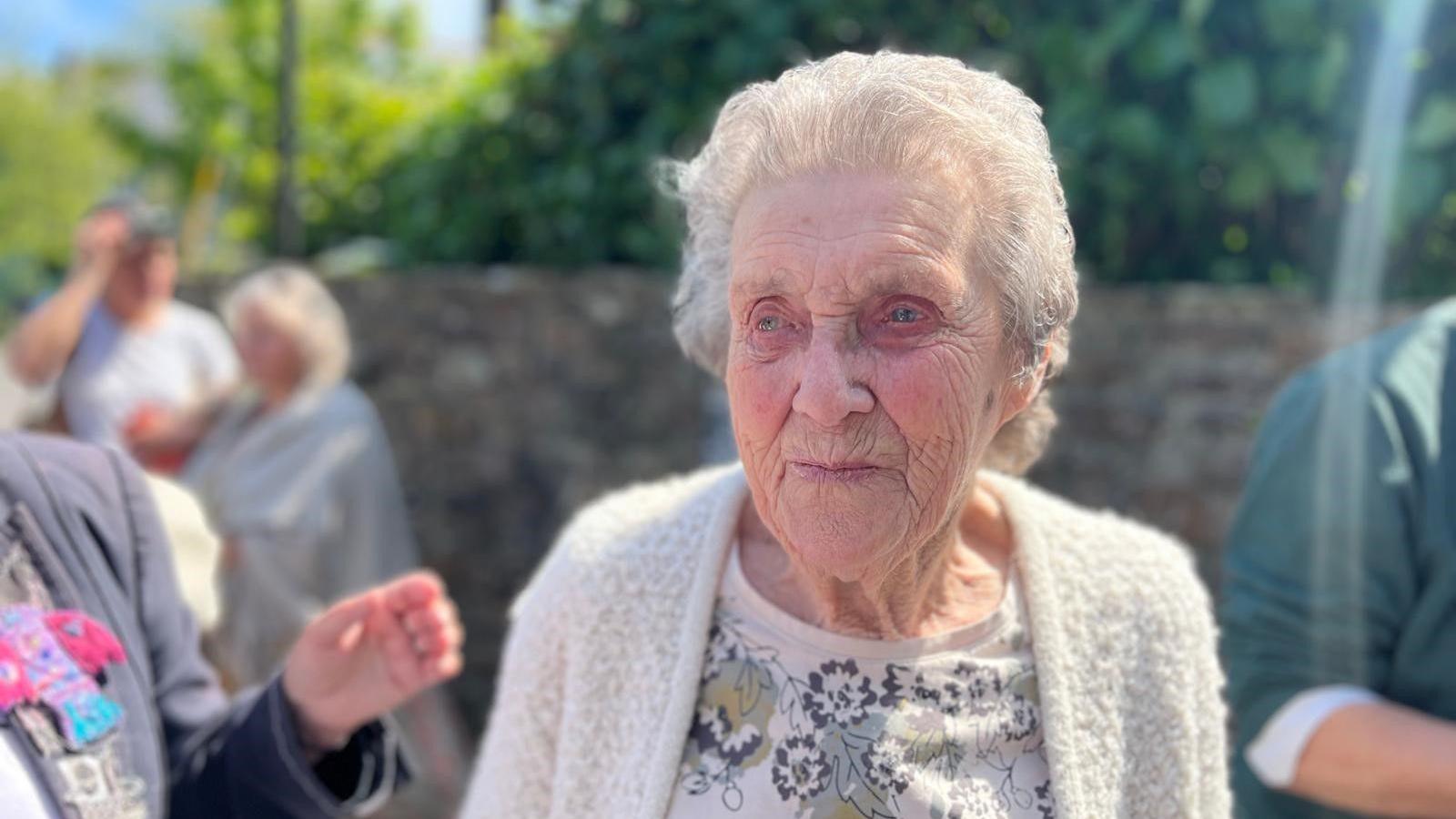
Ms Rodden said she was eventually reunited with her son 50 years later when he found her.
“[It was] like the final piece of a jigsaw being fitted,” she said.
She added: “To think that although slavery was abolished in the 1800s, a Dickensian way of life was gone, but not at Rosemundy.
“It was still in the past, and that was it really, and it means everything that we’ve been recognised at last…”
A Government spokesperson said: “This abhorrent practice should never have taken place, and our deepest sympathies are with all those affected.
“We take this issue extremely seriously and continue to engage with those impacted to provide support.”
”When it’s your kids hitting you, you can’t leave’
https://www.bbc.co.uk/news/articles/cy7gz3xdelno
”When it’s your kids hitting you, you can’t leave’
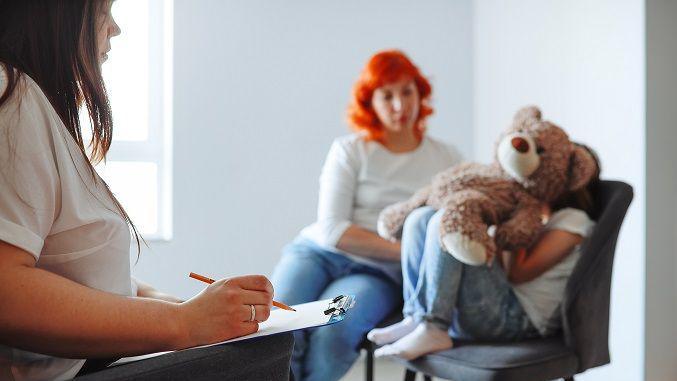
Helen Richardson
Political Reporter, NE & Cumbria
Jane Downs
BBC North East & Cumbria Investigations
- Published16 March 2025
Parents and guardians who have suffered violence at the hands of children in their care say support services are a “postcode lottery”. Despite a seeming rise in attacks, alongside greater awareness, experts agree the problem is not being properly addressed.
Here, one couple share their experience.
“She had me round the throat one day,” Angela, a guardian to a young girl, told the BBC.
“Another time she had me against the bench with a knife at at her throat, saying she was going to kill herself and make me watch.
“That was a really, really scary time that seemed to go on forever.”
After a family breakdown, Chris and Angela (not their real names) took on the care of a female relative who was still at primary school.
Over time, they say, the child’s behaviour deteriorated until the couple realised they were in physical danger.
They were open with social services from the outset, but say their concerns were “minimised” and they were just told to “keep going.”
“What do we do when she’s smashing the house up or when she’s got me locked in a room?”
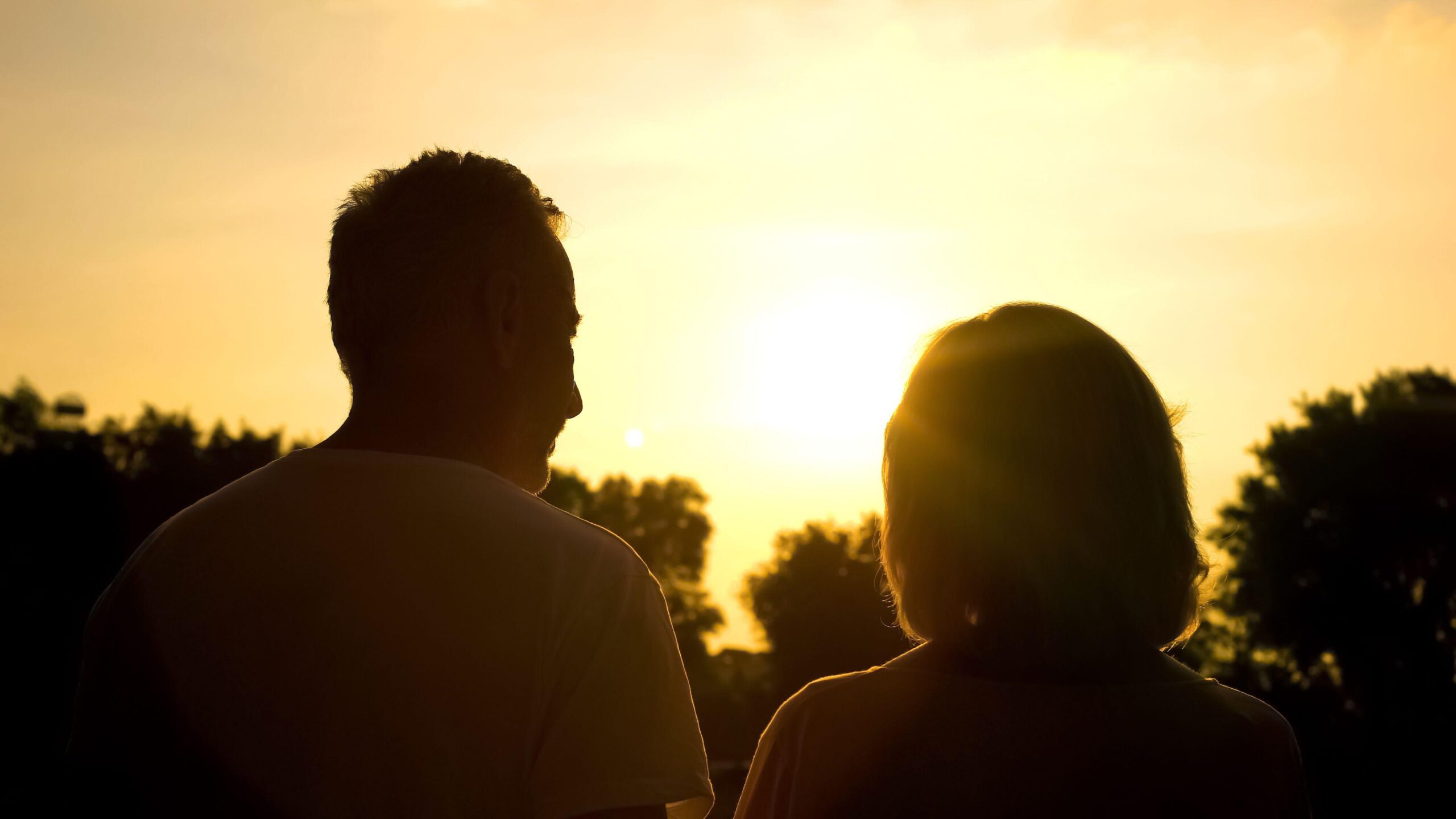
“Things were escalating beyond what was safe,” recalls Chris.
“I felt pathetic, because why should I have to call the police to protect us from an 11-year-old or a 13-year old? It’s humiliating.”
Chris and Angela say they eventually had no choice but to call the police, but attending officers made it plain the child would not be taken out of the situation, nor would charges be brought.
Violence on the rise?
Experts say child-to-parent violence and abuse (sometimes known as CAPVA, CPA or APVA) can be sparked by childhood trauma or a youngster witnessing domestic abuse in the home.
It can also be more common in families with neurodiverse children.
Because there is no standard definition for this type of domestic violence, offences are recorded in different ways across the country meaning it can be difficult to measure the scale of the problem.
We asked 39 police forces in England for the number of reported crimes involving adolescent or child on parent violence and abuse in their areas in 2015, 2019 and 2023.
Of the 17 forces which responded, 10 recorded more cases in 2023 than in 2019.
In north-east England, where Chris and Angela live, North Yorkshire, Northumbria and Durham police did not provide figures, but both Cumbria Constabulary and Cleveland Police reported an increase in cases.
One former social worker – who wishes to remain anonymous – told the BBC she witnessed violence against parents first hand, sometimes from children as young as eight.
She believes that, although the subject is now more openly discussed, services offered by some local authorities have yet to catch up with the level of risk some children present.
“These parents are dealing with this on a daily basis,” she says.
“I think things like social media, trying to manage the use of mobile phones, that’s becoming a real trigger point when they’re trying to put parental controls in place, because children don’t want that and they’re acting out.
“I’ve been in households where I’ve seen significant levels of harm directed towards parents and carers from children and, even with professional intervention to try to de-escalate, it has resulted in police call outs.”

Chris and Angela felt social services encouraged them to offer their child “leeway” rather than making it clear her behaviour was unacceptable.
“We’d tell them ‘look, we don’t think we can go on with this’,” says Chris. “We don’t think this is good for us or her.
“They would just blow smoke up (our backsides) about what a good job we’re doing. We felt hopeless.”
Angla adds: “Now she just thinks this is what people do.
“When you’re in an abusive relationship, you have the option to go. But when it’s your kids you don’t, do you?”
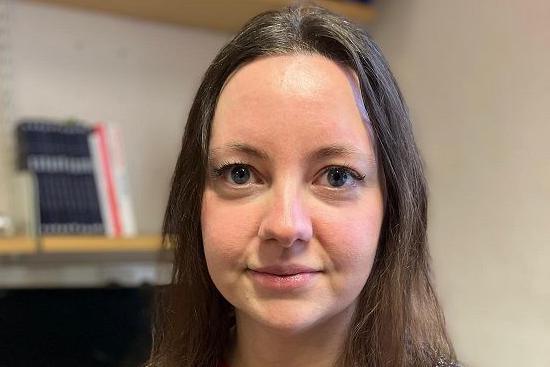
CAPVA researcher Dr Nikki Rutter believes early intervention is key for carers like Chris and Angela.
“Local authorities here in the North East are very good at responding to families where there are very particular high risk needs,” she says.
Dr Rutter points to what she sees as exemplary areas of practice in certain areas of the country, including Wales and Norfolk, but says problems lie in the systems that should refer families for help when they first have issues.
“Early intervention is very, very rarely occurring in any of the local authorities throughout the North.
“They’re dealing with the problem rather than preventing it in the first place.
“Sometimes it can be services saying ‘this isn’t our responsibility’, ‘we’re not commissioned to do this’ or ‘we are restricted in terms of staffing’.
“For those families it must just feel like there’s no way out or there’s not many people listening.
“Families are crying out for help, quite often from the child being four to five years old, and nothing is being done.”
Government plans pending
The government has pledged to halve violence against women and girls in the next ten years.
It says tackling abuse of parents in their own homes is a “vital” part of that challenge.
A Home Office spokesperson said: “We are continuing to develop our specific approach to child-to-parent abuse, taking on board the contributions to last year’s consultation.
“We will set out our plans in this area and respond formally to the consultation in the coming months.”
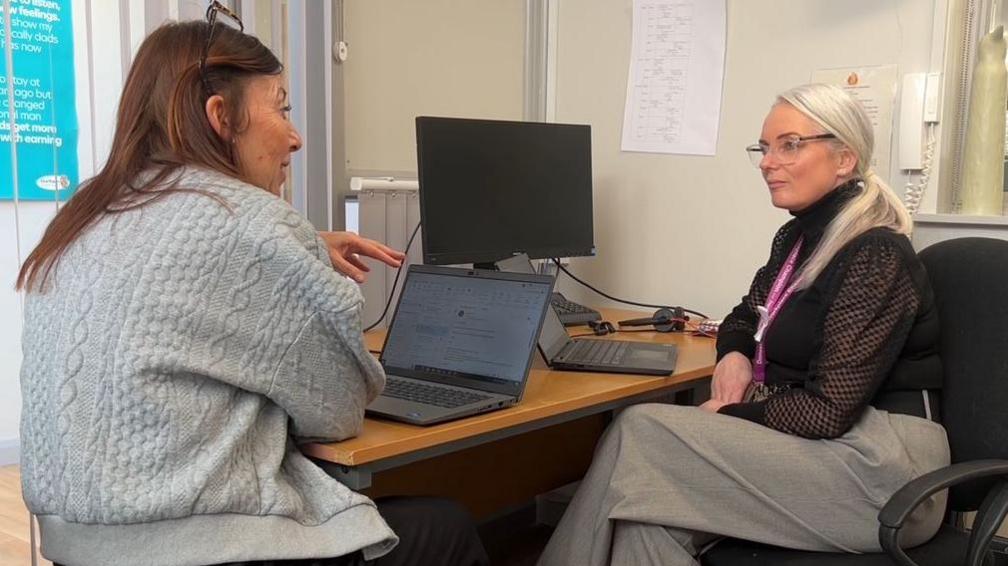
In County Durham, the police and county council have started jointly funding “ambassadors” to run a “Respect” programme with families that need help.
Young people and parents have their own workers who then come together over time to make changes.
Jackie Staff, one of the support workers, says violence towards parents and guardians is only just really starting to be discussed more openly, but things are changing as a result.
“We’re getting some real successes from the families,” Ms Staff says.
“They’re telling us that it is working and the behaviour has reduced.”
But Joy Allen, Durham’s Police and Crime Commissioner, says a lot of parents are still suffering in silence.
“One in 10 women who’ve been murdered by a man have been murdered by their son,” she says.
“That’s a significant fact that we need to address and early intervention is much better than escalating.
“We want people to have the confidence to come to us for support. It isn’t anything to be ashamed of and there is help out there.”
‘Let’s stop pretending’
Angela and Chris are clear about what they think needs to change.
“Definitely funding for children’s mental health I think is a massive thing, but also child-to-adult violence is not talked about,” says Angela.
“Parents are embarrassed. We were embarrassed.
“We didn’t want to tell anyone that this child has been violent. I think that’s a massive issue.”
Chris says he feels seeking support somewhere you can be honest about exactly what is happening is essential.
“Even if it’s Facebook groups, it’s people going through the same thing,” he says.
“Let’s stop pretending that this is not happening, that children aren’t being physically violent towards the parents.
“It takes the adults to do that, because the kids are never going to admit it.”
‘We love our adopted children… but after years of violent attacks we had no choice but to put them back in care’: Shattered parents reveal why so many adoptions fail to HELEN CARROLL
‘We love our adopted children… but after years of violent attacks we had no choice but to put them back in care’: Shattered parents reveal why so many adoptions fail to HELEN CARROLL
By HELEN CARROLL FOR THE DAILY MAIL
Published: 01:58, 29 November 2024 | Updated: 16:13, 29 November 2024
Having met while working at a children’s charity, Naomi and Martin were aware of the challenges of adopting children who have had a difficult start in life.
They also believed that, given their experience, if any couple had the skills needed to provide the right mix of love, nurturing and guidance required, it was them. However, 12 years after adopting two young children – years in which the parents were beaten and abused so violently they regularly had to call the police, and both suffered nervous breakdowns – the children, now aged 15 and 16, are back in care.
They lay the blame for this heartbreaking situation squarely on their local authority which, they say – due to a lack of funding and a ‘pass the buck’ culture – totally abandoned them to their fate.
Says Naomi, 45: ‘We did our best, but the children desperately needed professional help which, once they were officially adopted by us, was almost impossible to access.
‘I’m not saying that I thought we’d ‘save’ them, but I, naively, believed that with love, stability and permanence we were providing an environment in which any difficulties that arose could be worked through.
‘We never bargained for being kicked, hit, spat at and verbally abused – Martin is deaf in one ear after one particularly vicious punch from our son – and certainly not for the relationship with our children to completely break down.’
It’s notable, and poignantly sad, that this couple still refer to the brother and sister, whom they welcomed into their home aged two and three, as ‘theirs’. They love them and feel guilty about what happened.
They’d gone into the adoption process longing for a forever happy family, after learning they were unable to have children themselves.

Adoptive parents have been left traumatised, their marriages wrecked – and even driven to taking their own lives – by a system incapable of supporting them, writes Helen Carroll
It’s a tragedy shared by hundreds of adoptive parents across the UK, who’ve been left traumatised, their marriages wrecked – and even, in extreme cases, driven to taking their own lives – by a system woefully incapable of supporting them.
One support group, PATCH (Passionate Adopters Targeting Change with Hope), which has 700 members, is campaigning for systemic change to address this ‘crisis’. Most members share the same grievance: that children are almost always removed from their birth parents due to significant abuse or neglect, which often begins during pregnancy, where they are exposed to drugs and alcohol. This leaves the children with symptoms of extreme trauma.
However, when behavioural issues manifest post-adoption – some of which can be genetic – the adoptive parents are left to fend alone and, ultimately, blamed when the situation becomes unmanageable.
According to figures from Adoption UK, 65 per cent of adoptive parents experience violence or aggression at the hands of their children. And, based on responses to the charity’s annual survey, the number of adopted children leaving the family home ‘prematurely’ is rising, from three per cent in 2021, to seven per cent in 2023.
‘There’s a common, but false, belief that trauma is healed through love, and therefore adoption is the happy ever after, which any psychologist or psychotherapist will attest, it is not,’ says Fiona Wells, who runs PATCH and is herself a social worker, working in fostering, and also both an adopter and adoptee.

According to figures from Adoption UK, 65 per cent of adoptive parents experience violence or aggression at the hands of their children
‘Social workers are not experts in trauma, they’re experts in risk and family life. What these families need is trauma-informed therapeutic, as well as practical, support, but once an adoption is finalised the children, and any issues they have, seem to be considered the responsibility of the adoptive parents.
‘Support is, technically, available, through regional adoption agencies, but there are often lengthy delays and misdirected guidance towards inappropriate solutions which perpetuate the problems.’ Naomi and Martin’s experience was sadly typical. The children, Tamsin and Joseph, had been taken into foster care aged one and two having suffered extreme neglect. Their mother abused drugs and alcohol, and they were not fed or washed. Their biological father was in prison for domestic violence.
Joseph was still a toddler when he started lashing out at them. Naturally, the couple turned to their social worker for guidance.
The only advice was to use ‘non-violent restraint’, such as changing the subject and distracting the child in a confrontational situation, and ‘natural consequences’ tactics i.e. leaving it to the child to work out the results of their actions themselves.
Blunt instruments indeed when you are being punched in the head or attacked with a baseball bat.
As one specialist adoption solicitor put it, with highly damaged children the approaches are like ‘applying an Elastoplast to an arterial wound’.
Unsurprisingly, things got worse. Their daughter’s violent outbursts began after she started secondary school.
Naomi believes this was due to her being dyslexic and on the autism spectrum – although she was never diagnosed. Again, the social workers were of little use.
Tamsin was 14 when, after a fall out over something Naomi struggles to recall, she attacked Martin so viciously, biting him and hitting him with a bat, that Naomi had no alternative but to call the police for help.
‘They arrested her, keeping her in a cell overnight, which was horrific, but they thought it would teach her a lesson,’ says Naomi. ‘Sadly, it didn’t, and it happened again, two weeks later.’
Then, one day she returned from a brief dog walk to find Joseph and Tamsin brutally attacking one another, close to the top of the staircase, ‘biting, scratching, kicking, hair pulling and spraying deodorant into each other’s faces’.
After trying, in vain, to separate them, in desperation Naomi called the police again. By the time officers arrived, the siblings had fled and Joseph was later found, sitting on a railway bridge, threatening to jump.

When behavioural issues manifest post-adoption – some of which can be genetic – parents are left to fend alone and blamed when the situation becomes unmanageable (file image)
Police managed to pull him to safety, and he was referred to CAMHS (Child and Adolescent Mental Health Services). The couple were told Joseph needed ‘dyadic developmental psychotherapy’, a specialist treatment for children who have been hurt or neglected in their early years, which would require both Naomi and Martin to attend weekly sessions.
This proved very difficult for Martin. As the family breadwinner, who now works in finance, he was unable to take time off work in the middle of the day. Though evening sessions were available, the couple’s request for these was ignored. Social workers were unsympathetic, and highly critical of him in reports.
Both children developed serious mental health problems, and would regularly self-harm, shutting themselves in the bathroom. At their wits’ end, the couple took the lock off the bathroom door – only to be told by social workers to replace it to ‘protect the children’s privacy’.
‘I was terrified one of them might die and begged social workers to get them urgent appointments with CAMHS, which still felt like our only hope, yet there seemed to be no urgency back then – though I understand they’ve had referrals now, after the adoption has broken down,’ recalls Naomi.
Everything came to a head at the beginning of the year when Tamsin had gone missing. Martin was out with Joseph in the car, scouring the streets, when he had what can only be described as a nervous breakdown. He later described how he’d started driving very quickly, feeling like he wanted to die.
‘Martin was full of remorse,’ says Naomi. ‘But we realised we were both so broken we could no longer cope and asked that the children be taken back into care.’
Initially the siblings were taken into care under a Section 20 order, a voluntary agreement between the adoptive parents and the local authority for them to provide temporary care, but now have a ‘full care order’, which means they will remain in local authority homes until they are 18.
The couple still see the children – last week Naomi met Tamsin to go shopping and took Joseph for tea and cake. On another occasion, Martin took Joseph to play pool. The last time the children visited the family home, for Sunday lunch, they stole £100 from a safe. ‘We miss them and still consider them our children,’ says Naomi.
‘And we don’t put any of the blame for what’s happened on them. They’ve developed a fight or flight response as a result of their early trauma and haven’t had the professional support they need. However, as much as we still love them both, it’s a relief they don’t live with us any more.’
One explanation for the rise in cases of children having to leave their adoptive home is the effects of widespread cuts in funding to local authorities and CAMHS, says Alison Woodhead, of Adoption UK. ‘Adopters often feel quite abandoned, not knowing what they’re entitled to or what support is out there.’
This was certainly the case for Stephan, a little boy who, together with his older sister Juliet, was adopted by Sophie Greenwood and her wife, Susie, a schoolteacher, in 2012, when they were aged two and three.
Both children were malnourished, covered in sores and fleas and so terrified of water that Sophie and Susie were unable to bath them, unless they climbed in too.
While Juliet developed normally, Stephan had abnormal brain development that could have been caused by exposure to toxins in the womb, as well as suspected foetal alcohol syndrome. He was diagnosed with autism, ADHD and oppositional defiant disorder (ODD).
‘We wanted them to stay together, so we could all be a forever family,’ says Sophie. ‘However, we had no idea what a fight we had on our hands to get our son the support he needed.’ As a toddler, he was easy to pick up and distract, but as he grew bigger he grew increasingly violent – biting and kicking his parents and his sister.
Warned not to physically restrain him, Susie and Sophie would hold a kickboxing pad in front of them to soften the blows.
Eventually, when he was eight, they couldn’t cope any more.
‘A therapist, assigned by the local authority, agreed that our son needed a specialist residential school, but said the only way we’d secure one was to report any significant physically aggressive incidents to the council and the police, so there was a log.
‘We did this, and the local authority pushed back, placing both children on the child protection register under suspicion of ’emotional abuse’.’
Stephan moved to the residential school aged ten, leaving Juliet at home. In theory, this meant Susie was able to return to work as a teacher. However, she was now on record as being the mother of children ‘at risk’.
‘The fight for support and the shame just broke her,’ says Sophie. ‘She was so tired and constantly ruminating over the injustice of it all.’
One evening, in late 2022, Susie took her own life.
Sophie sobs as she recalls breaking the terrible news to their children — Susie’s death heaping further trauma on top of what they had already endured.
Juliet, 15, is developing normally, while Stephan still comes home regularly – but remains prone to lashing out. Although she cannot bear to imagine her life without her two children, Sophie admits that, had she and Susie known what lay ahead, they would have been unlikely to proceed with adoption.
Adoption specialist solicitor Nigel Priestley says the legal firm where he is a senior partner, Ridley & Hall in Yorkshire, is contacted by about 150 adoptive families in crisis a year.
‘Long gone are the days when most babies adopted came from teenagers, in mother and baby homes,’ says Nigel. ‘We have a whole host of children coming through who carry significant issues with them. Specialist support for these children costs local authorities a fortune and, over the last ten years, the services that provide support have been cut to the bone.’
Alison from Adoption UK stresses that this lack of funding is the issue, and that the devastating impact of adoption breakdown on the child should not be forgotten. ‘When adopted children and young people leave the adoptive family home prematurely it is devastating for all concerned, particularly the young person.
‘It’s almost always because they are let down – by adoption services, by mental health services and by the education system. Most adoptive families describe a constant battle to get the support their children and young people need. When children and young people do leave their adoptive family home prematurely, many return there. And many adopters with children and young people living away from home are still intimately involved in their lives and their care.’
As one mother, whose marriage didn’t survive after she and her husband adopted three traumatised, and later violent, siblings who had suffered terrible neglect and abuse, says: ‘I don’t blame the boys for how they behave – if I’d had their start in life, I’d no doubt struggle to control my emotions too. I blame the system for not giving them the help they needed. There should have been ongoing support in place from the get-go.’
Hundreds of devastated parents up and down the country, whose adoptions have been similarly disrupted, agree wholeheartedly.
- For support, visit the PATCH website at ourpatch.org.uk
- Names of children and parents have been changed.
Uncertainty for families as China ends foreign adoptions
https://www.bbc.co.uk/news/articles/crmwrpe3m3do
Uncertainty for families as China ends foreign adoptions
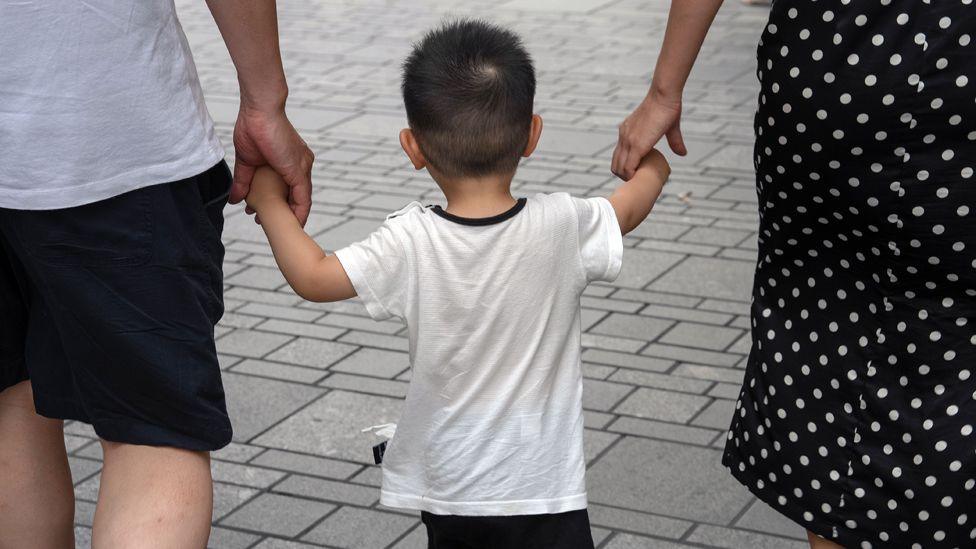
Nathan Williams
BBC News
- Published6 September 2024
China has announced that it is ending the practice of allowing children to be adopted overseas, bringing uncertainty to families currently going through the process.
A spokeswoman said that the rule change was in line with the spirit of international agreements.
At least 150,000 Chinese children have been adopted abroad in the last three decades.
More than 82,000 have gone to the US, a greater number than anywhere else in the world.
At a daily briefing Thursday, foreign ministry spokeswoman Mao Ning said in the future Beijing would only allow foreign nationals who are relatives to adopt Chinese children.
She did not explain the reason for the decision, other than saying it was in line with international agreements.
Ms Mao thanked families “for their desire and love in adopting children from China”.
The ban on foreign adoptions has created uncertainty for hundreds of families in the US currently going through the process of adopting children from China.
In a call with US diplomats in China, Beijing said it would “not continue to process cases at any stage” other than those cases covered by an exception clause. This position was confirmed by spokeswoman Ms Mao.
Washington is seeking clarification from China’s civic ministry.
China’s controversial one-child policy, introduced in 1979 when the country was worried about a surging population, forced many families to abandon their children.
Families that violated the rules were fined and, in some cases, lost jobs. In a culture that historically favours boys over girls, it often meant that female babies were given up.
International adoption was formalised in the 1990s, and since then tens of thousands of children have been adopted, with about half going to parents in the US – including celebrities like Meg Ryan and Woody Allen.
However, the international adoption programme has at various times come under criticism. In 2013, Chinese police rescued 92 abducted children and arrested suspected members of a trafficking network.
Critics at the time pointed to China’s one-child policy and adoption laws, which they said had created a thriving underground market for buying children.
A number of countries have expressed concerns about international adoptions.
Denmark has closed its only overseas adoption agency, over concerns about fabricated documents. The Netherlands has also said it will no longer allow its citizens to adopt children from abroad.
But Beijing has also altered the way it views children. In stark contrast to the position taken by officials at end of the 1970s, the country’s leaders now worry there are not enough babies being born to sustain the population.
In 2016 China scrapped the one-child policy and in 2021 Beijing formally revised its laws to allow married couples to have up to three children.
In recent years, the Chinese government also offered tax breaks and better maternal healthcare, among other incentives, in an attempt to reverse, or at least slow, the falling birth rate.
But these polices have not lead to a sustained increase in births, and in 2023 the country’s total population fell for the first time in 60 years.
https://www.bbc.co.uk/news/uk-england-gloucestershire-68629466
Couple adopted vulnerable children to abuse
- Published
22 March
Delay and frustration in adoption law’s first year
https://www.bbc.co.uk/news/articles/cp3dx01v8x8o
Delay and frustration in adoption law’s first year
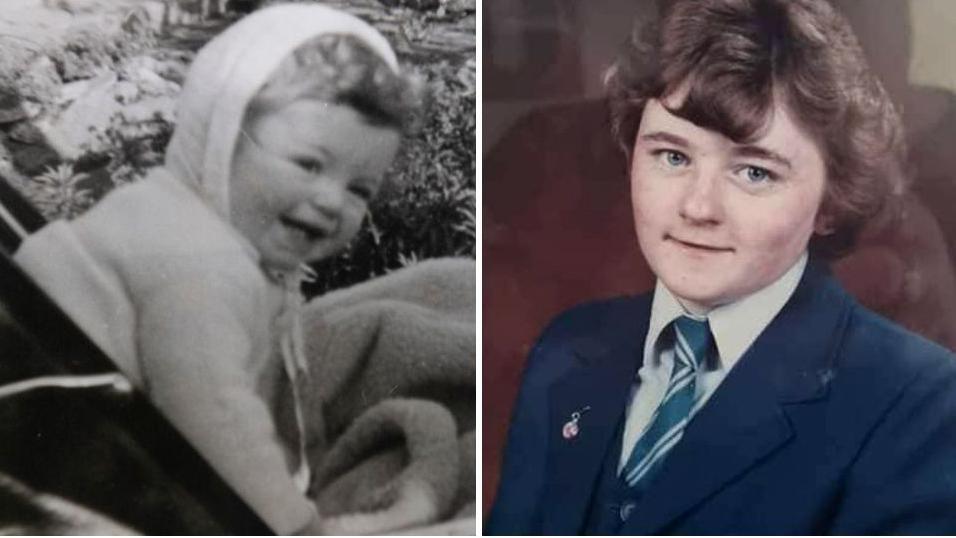
At a glance
- More than 10,000 requests for adoptees’ birth records have been submitted during the first year of a new Irish law
- The authorities struggled to meet demand and missed legal deadlines
- A total of 5,500 requests were made to use a new family tracing service
- More than half (53%) of tracing requests are yet to be allocated to staff
Eimear Flanagan
BBC News NI
- Published3 October 2023
An Irish law that gave adopted people the right to access their birth records has led to more than 10,000 applications during its first year of operation.
The Birth Information and Tracing Act, external was designed to end much of the secrecy embedded in Ireland’s 70-year-old adoption system.
But for many adoptees waiting decades for answers about their early lives, the new procedures meant delays and frustration.
The legislation created a new family tracing service and throughout the year 5,500 requests to find relatives were submitted.
However, due to the complexity of some searches, 53% of tracing requests are yet to be allocated to staff.
“I am relying on a system that is working at a snail’s pace,” said Linda Southern, who is searching for her birth parents.
The 48-year-old Dubliner was adopted in 1975 at six weeks of age.
She spent her first 47 years not knowing her birth name nor the names of her mother and father.
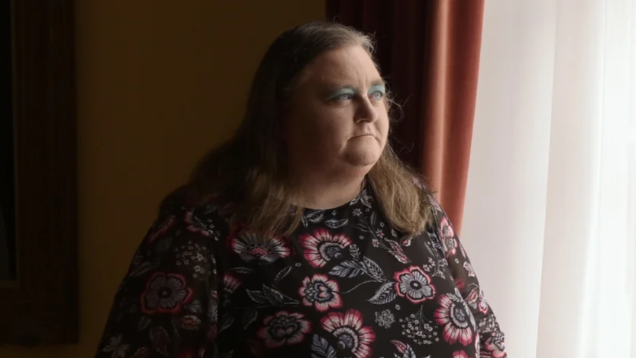
That is because until 3 October 2022, Irish adoptees had no automatic right to see their own birth certificates, nor to know their biological parents’ identities.
The new law was supposed to give adoptees access to birth records within 30 days, or 90 days in complex cases.
Two organisations tasked with releasing records struggled to handle an early surge of applications.
The Adoption Authority of Ireland (AAI) and child and family agency Tusla both missed statutory deadlines.
“The initial surge led to wait times which would be frustrating and which we regret,” said AAI interim chief executive Colm O’Leary.
“When you’re starting off a process and you’re learning that records are held across various sources, it takes time to become familiar with all of the record types,” he explained.
A Tusla spokeswoman said “a significant portion of the applications are classified as complex which means they require more time”.
But adoptees argue authorities should have been better prepared.
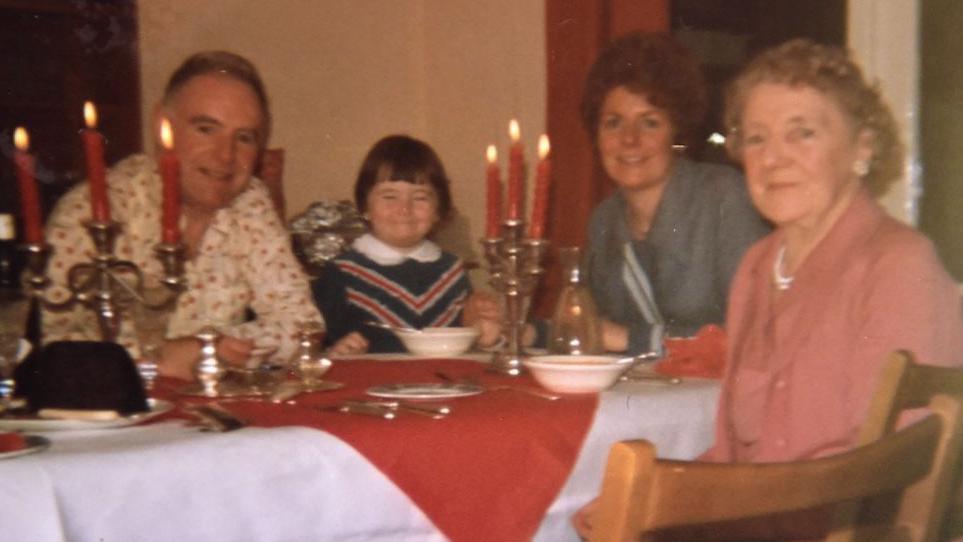
“Surely, state bodies would have had a basic idea of the number of adoptees who would want to at least get their birth information,” said Ms Southern.
After initial delays, she received her own documents which – for the first time – revealed her original name and parents’ names.
However, she still needs help finding her biological family and spent the past year waiting for news.
“I don’t know if they will ever trace my birth mother or not.
“If they can’t, I should be told,” she said.
“They should have presumed the majority would want to trace – better to presume that too many people would wish to trace birth families than too few.”
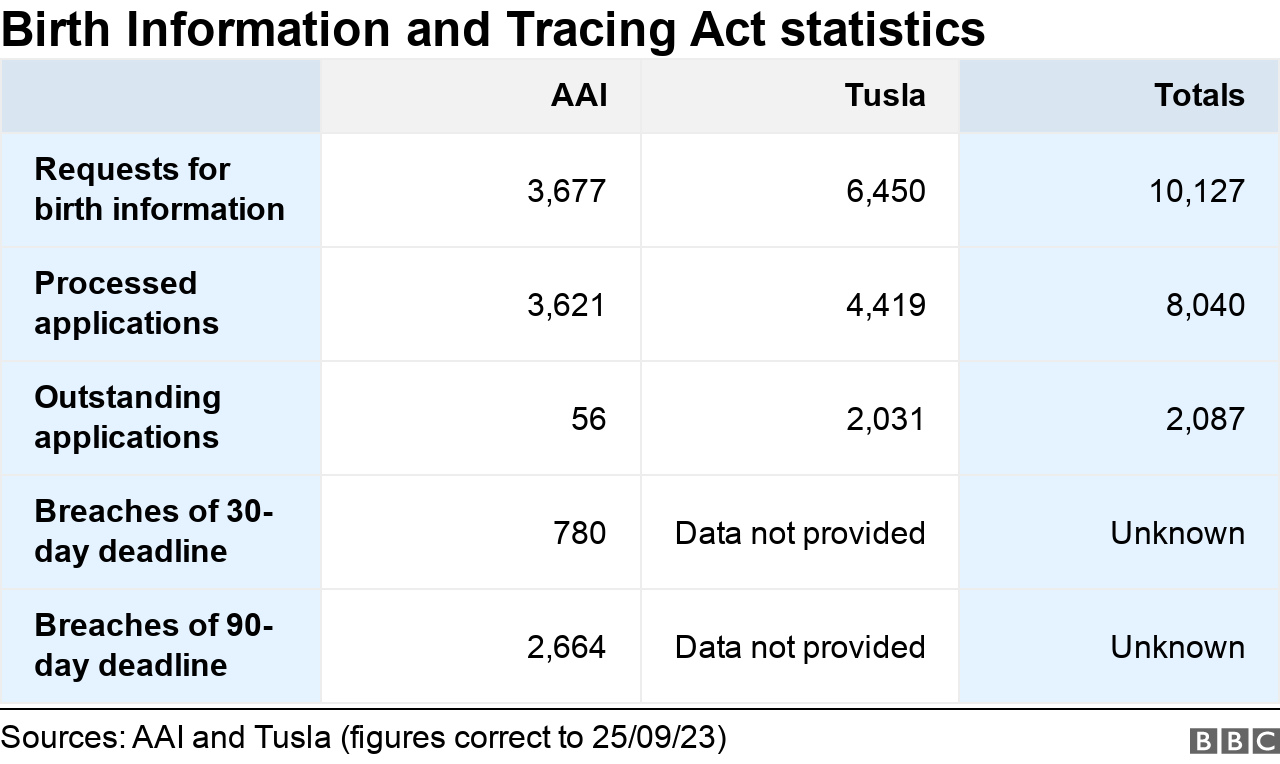
‘Belfast baby’
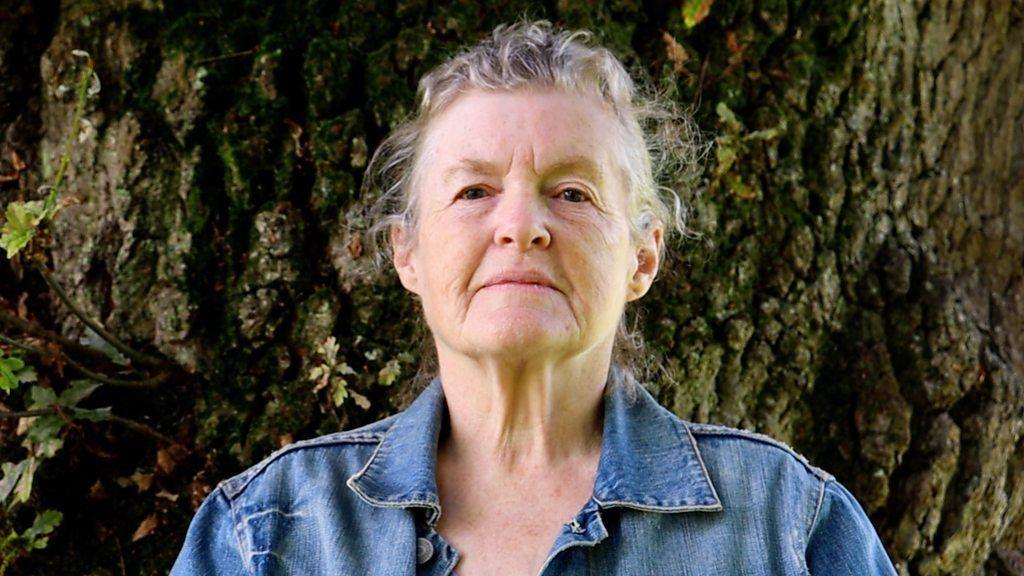
Loraine Jackson had hoped her birth files might shed some light on her cross-border adoption.
She grew up in Dublin, with barely any information about her birth.
But in her early 40s, she found out she was actually a native of the United Kingdom, having been born to a single mother in Belfast in 1948.
Her parents died years before she could trace them.
When she spoke to BBC News NI last year, she expressed hope her files might reveal how or why she was taken across the border for adoption.
After months of waiting, a “fat package” arrived in the post which included an unredacted version of her adoption agreement.
For the first time, she saw her relatives’ signatures and finally found out who authorised her adoption.
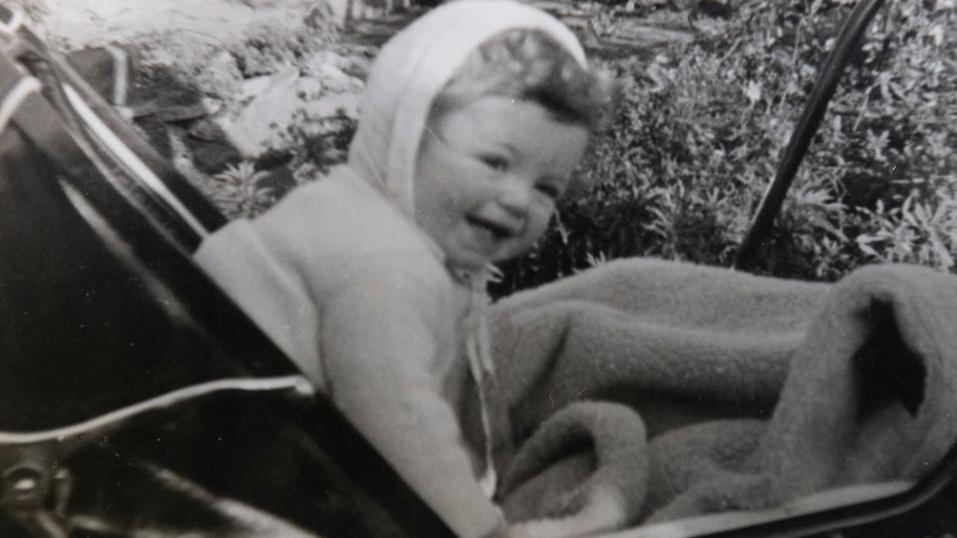
“My birth mother had not been present at the signing. Her sister signed for her,” Ms Jackson explained.
She also expected her files would contain information about the standard of care she received in Bethany children’s home in Dublin.
But apart from a photocopy of her name in Bethany’s admission book, she was disappointed.
“The information just didn’t seem to be there. Whether records were not kept as well in those days, I don’t know.”
Although left with many unanswered questions, her maternal aunt’s role in her adoption was new information to her.
“It was definitely worthwhile doing, and I’d advise anyone who hasn’t applied yet to go for it.”
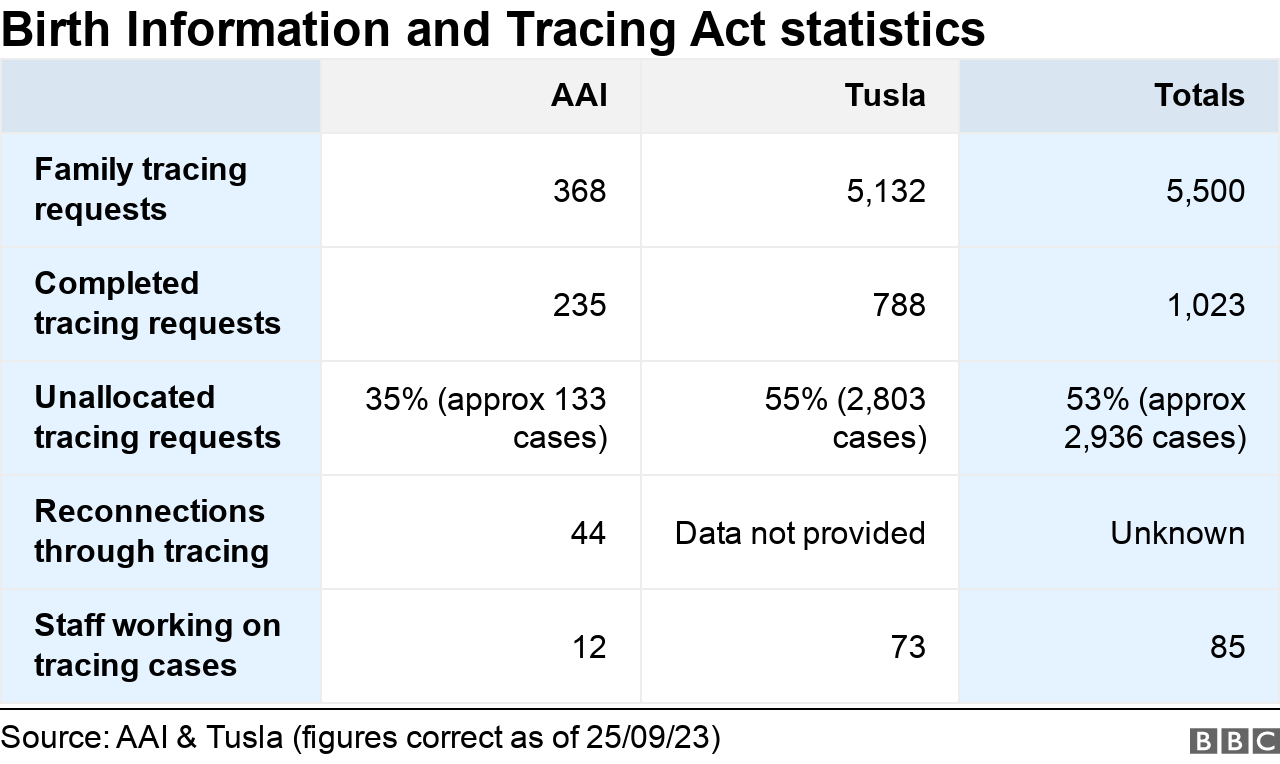
AAI staff received a wide range of feedback from adoptees about their birth files – from delight to disappointment to disbelief.
“A lot of people have said: ‘Is that it? Is there nothing else?'” Mr O’Leary said.
He acknowledged some adoptees were dismayed to learn that nothing more exists on file than details they already knew.
Others have received heavily censored documents.
“Sometimes the authority gets records that are already redacted prior to us getting them… we cannot unredact it,” Mr O’Leary explained.
He also said AAI staff can apply redactions themselves, in cases where personal information refers to a third party.
However, he added applicants can request a review if they believe files were “inappropriately redacted”.
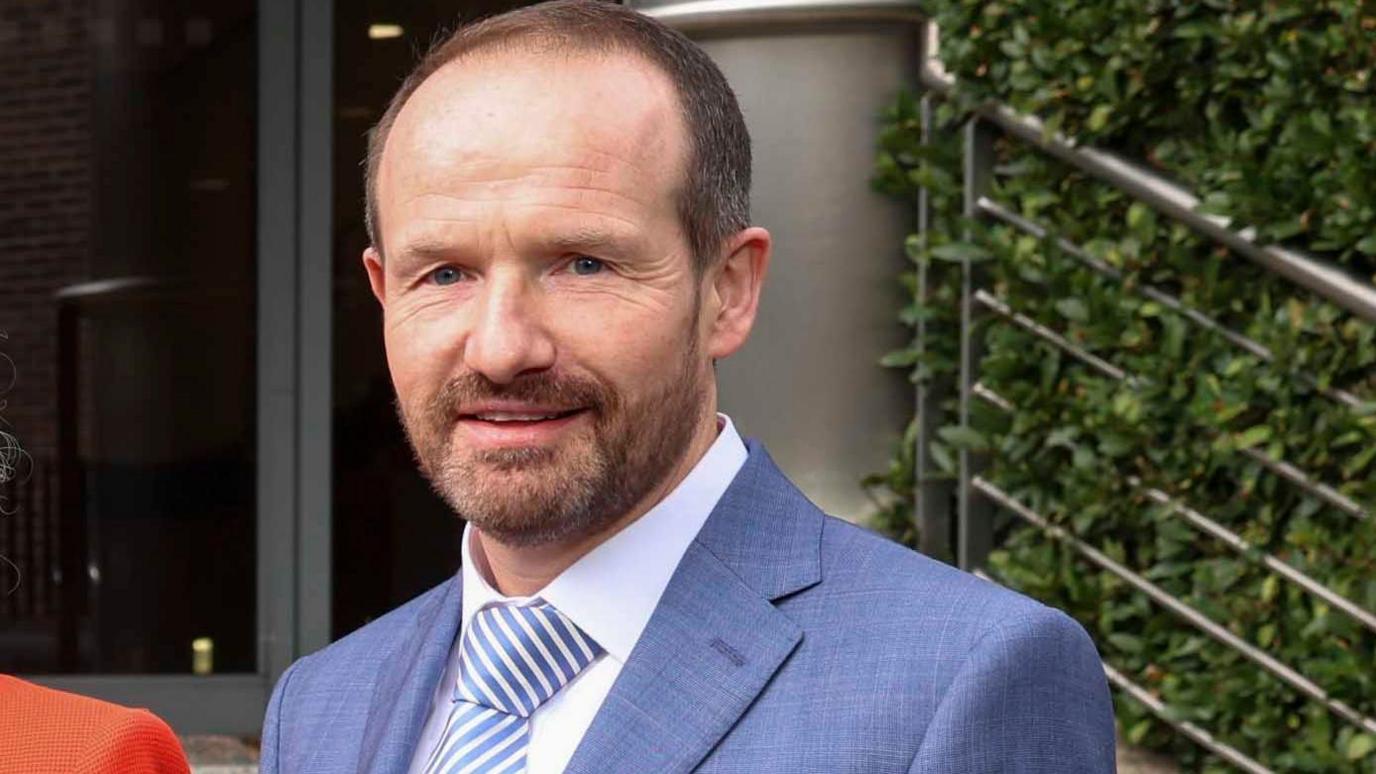
The interim chief executive acknowledged the AAI’s 12 social workers have “significant” tracing workloads.
But he said tracing “is not a linear process” and adoptees often pause the search themselves to digest new information.
“You’re dealing with a very emotive situation,” Mr O’Leary said.
“People may initiate a trace, thinking that their birth mother would want to hear from them, and they have to take on board that the birth mother does not want contact.”
But the new law produced positive outcomes too – the AAI’s tracing service has facilitated 44 family reunions.
“Sometimes I’ll go to the kitchen and I’ll see a social worker taking out the fancy crockery and making tea” Mr O’Leary said.
“They’re bringing it into a room where a family is being reunited.”
He added that when staff help connect families “there is a sense of success, and of delivering on the legislation”.
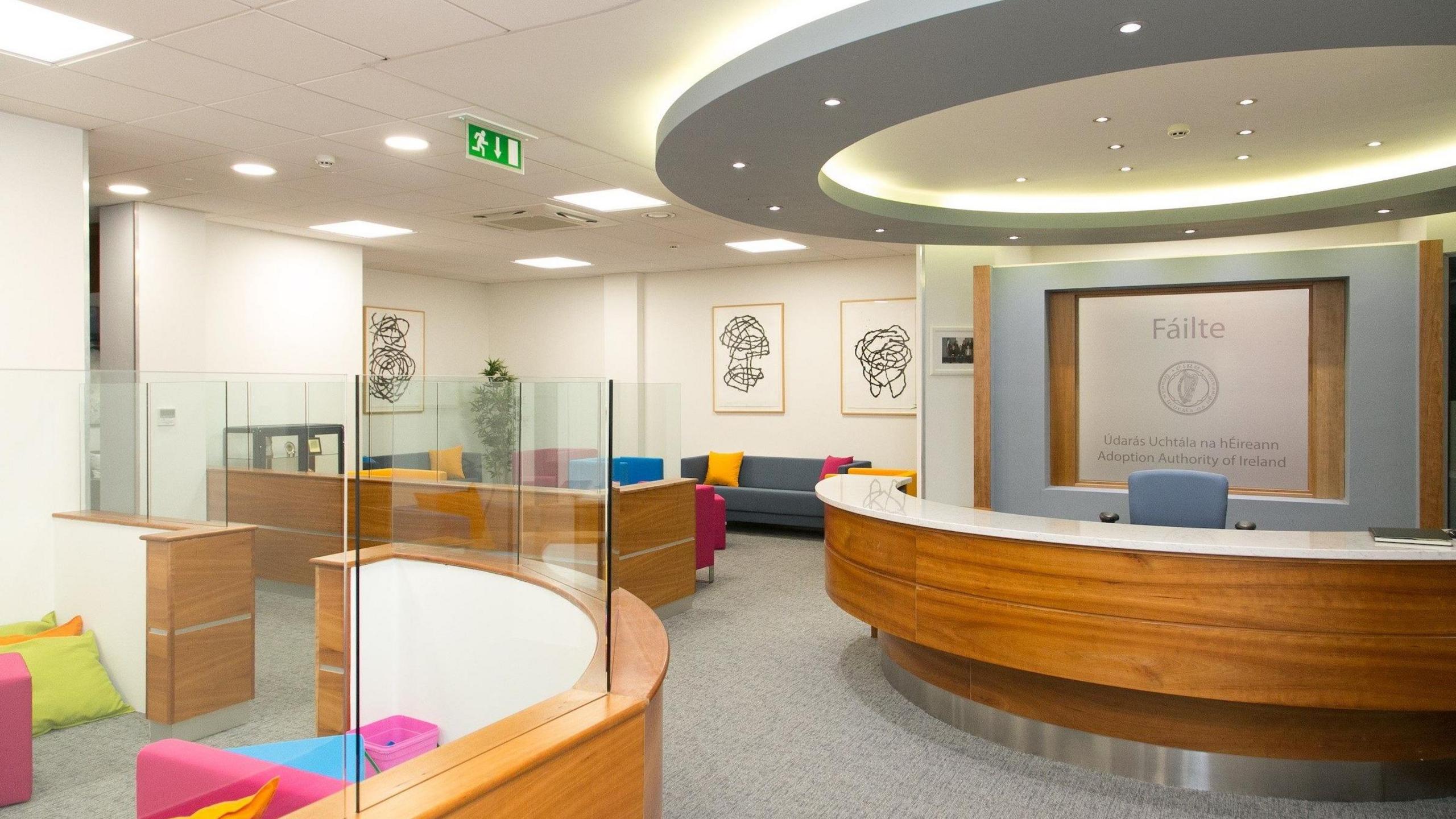
The AAI’s backlog of birth record applications is almost cleared and by last week, just 56 were outstanding.
Tusla has a much larger backlog which it expects to clear by June 2024.
It said from1 September, all new applications are being processed “within statutory timelines”.
If you are affected by the issues raised in this story, help and support can be found at BBC Action Line.
Bessborough mother and baby home should have been bought by the State, Tánaiste says
Bessborough mother and baby home should have been bought by the State, Tánaiste says
ireland
20/09/2024 | 14:48 PM
Olivia Kelleher
Tánaiste Micheál Martin has indicated that he has always been of the view that the State should have purchased Bessborough, the former mother and baby home in Cork, for conversion into a memorial or amenity site.
This week a decision made by Cork City Council to refuse planning permission for a proposed 92 unit residential development at Bessborough in Blackrock in the city was upheld by An Bord Pleanála.
The planning authority backed the decision of the local authority because of the historical landscape and potential human remains at the grounds.
Speaking in Cork, Mr Martin said that options should be explored in relation to the use of the site.
“I was always of a view that the local authority with the State should have purchased that site and have a proper memorialisation but also see if we could do things on a planned basis. It is a beautiful area. It can potentially be a very strong amenity area for the area as well, but that was always my view on it.
“I felt at the time that maybe the local authority should have got involved earlier and pre-empted what happened and bought it because there are medical facilities, or HSE facilities on the site,” he said.
“There are a variety of facilities on the site, and it is a natural area and a green area as well, and we need to look at that as well.”
Meanwhile, Bessborough became notorious for the cruelty and neglect of mothers and their babies.
Of the more than 900 babies who died at Bessborough or in Cork hospitals having been transferred from the mother and baby home over the course of seven decades, less than 70 have known burial sites.
Survivors of the home have broadly welcomed the decision by An Bord Pleanála to deny planning for building on the site.
Carmel, whose mother gave birth to a boy who died in Bessborough, told Red FM News of her delight at the decision by the planning authority.
“I’m delighted it is being refused. All the grounds potentially have burials in them. It is not just one particular area.
There hasn’t been an investigation to establish whether there is a mass grave or where the children are but what we do know is that there is witnesses that have witnessed burials take place.”

